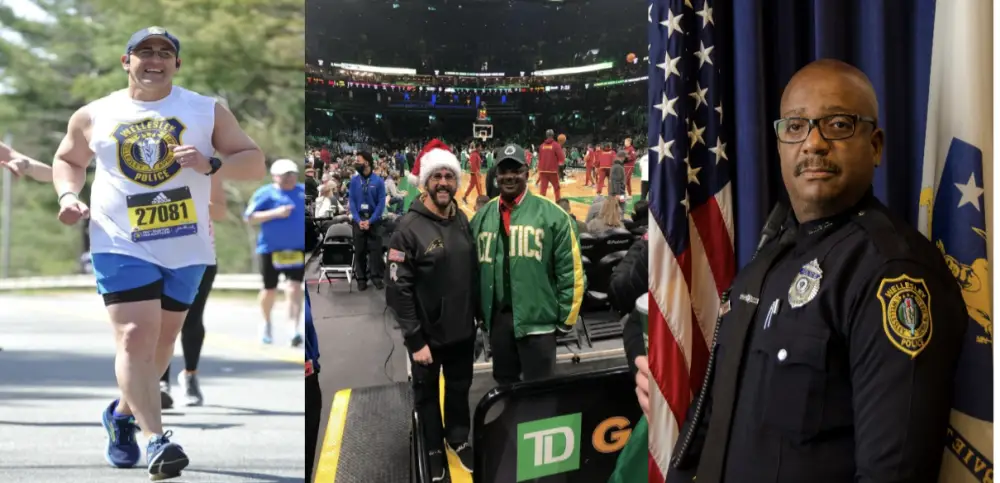Wellesley Police Officer running New York City Marathon in honor of friend and fallen colleague
Wellesley Police Prosecutor Tim Barros recalls the first time he met Lamars Hughes back in 1995, before they were colleagues. Barros had walked into a Boston Chicken restaurant where Hughes was the only other customer. The two chatted, and as Officer Hughes left, he said “I’m sure I’ll see you around town.”
Indeed, three years later they became colleagues when Barros joined the force.
They remained friends until a year ago, when Hughes died, just three years away from retirement.
Hughes’s life was cut short following a car accident while on duty in early 2023. He was out of work for an extended period after the accident while recovering from injuries, and Hughes and Barros talked regularly about work and family life.
“Every conversation ended with us laughing and making jokes at the other’s expense,” Barros recalls.
On Nov. 13, 2023, Barros was sitting in his office at the police station when his cellphone rang. Upon seeing it was Hughes’s number, Barros bantered “New phone. Who’s this?” Sadly, the voice on the end was that of Hughes’s wife, Angeila, who was at the hospital and broke the news that her husband had passed away.
“Over the next few months, we learned that Officer Hughes died from a pulmonary embolism, resulting from his lack of mobility after the car accident. Something we couldn’t have seen coming. So, where do we go from here?”
Barros is going to New York City in November to run the marathon, something his friend Hughes had suggested he do after running the Boston Marathon. Barros is running with a charity bib number from the National Blood Clot Alliance—Stop the Clot (you can donate at Barros’s fundraising page).
Barros will be wearing green, Hughes’s favorite color, likely because he was a huge Boston Celtics fan.

SUBHED: Honoring Officer Hughes
Barros says “Lamars was a remarkable man” who grew up in Boston, and attended South Boston High School during the forced busing years.
“Something that was not easy for him, but thankfully, sports assisted with being accepted. He used to tell me that playing on teams made skin color irrelevant because the uniforms were the same color,” Barros says. “They all stuck together as a team.”
As someone who loved helping people, Hughes always knew he wanted to be a police officer, Barros says. In 1993, he took the statewide Civil Service Police Exam and as required, picked four communities to send the scores to. He chose Boston, New Bedford, the MBTA, and Wellesley, which Hughes said needed a Black officer in the wake of a notorious mistaken identity incident involving Boston Celtics player Dee Brown.
In 1994, Hughes became Wellesley’s first Black police officer.
“For the next 29 years, Hughes was a staple of the Wellesley community and the police department. Everyone knew him. Everyone trusted him,” Barros says.
Hughes served in multiple positions with the Wellesley Police Patrol Union, including vice president and president.
“He enjoyed talking with residents and businesses on his beat. And he enjoyed laughing with everyone. He had the most unmistakable belly laugh that was infectious. Something I miss but still think of regularly,” Barros says.
Hughes was also a big family man. In 2006, he married Angeila, forming a union that resulted in a blended family of five children and five grandchildren. He regularly hosted BBQs and gatherings at his house.
The process has started to get Officer Hughes’s name on the wall in Washington, D.C. as part of the National Law Enforcement Officers Memorial next year during National Police Week. His name will also be added to the memorial in front of the Wellesley police station.